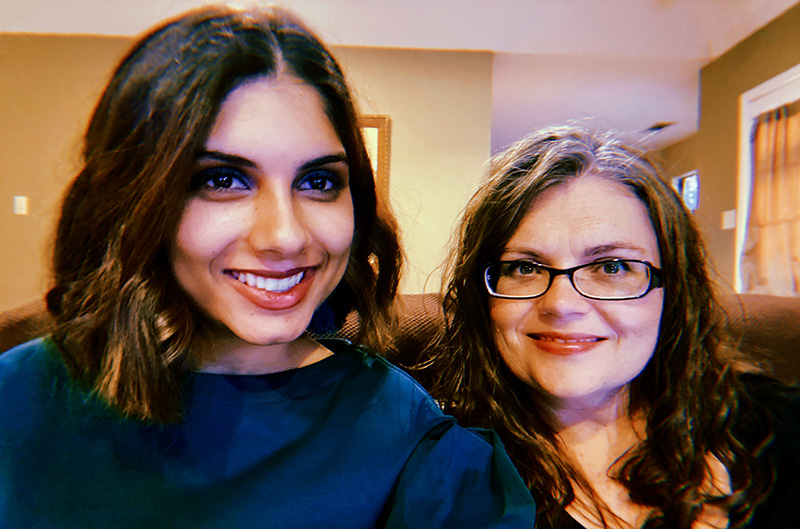 MC student Zada Kadir grew up very attached to school. After her parents divorced
when she was only two months old, she was a pawn in custody battles, but school was
always a constant in her life.
“I got to see the opposite of a stable home life,” Kadir admitted. “When I was in
elementary school, my brother and I went back and forth between our parents. It was
very stressful because my father’s home was unstable. I felt like I was living two
completely different lives. At my father’s we experienced emotional abuse and witnessed
physical abuse between my then-stepmother and him. My mother’s home, on the other
hand, was very stable. We ate dinner together as a family, and my mother and stepfather
helped me with homework. My father’s home consisted of a tiny, single-wide trailer
that was completely trashed with more than five dogs, and we would not get enough
to eat.”
Though she sometimes went hungry, Kadir’s family gave her the most precious gift by
showing her the value of hard work. Her grandmother on her father’s side was born
in Guyana. She had five children and her husband died when they were young. She decided
to immigrate to the U.S. and worked as a nurse. She was eventually able to send enough
money back so all her children could also come to the U.S.
Kadir’s grandmother on her mother’s side was born into hard labor. When she was in
8th grade, she had to be pulled out of school to help with cotton picking. Her family
later got into the lumber business where she learned how to haul massive trucks of
lumber at a very young age. She met Kadir’s grandfather at a box factory where they
dropped off the lumber to be processed.
“Both my grandmothers grew up in poverty,” Kadir said. “It wasn’t even middle class—just
plain and simple poverty. They worked every day to provide for what was on the table
every night. When my mother and father got divorced, she was caught in the same cycle.
She had nothing. She looked at my brother (then three years old) and I (then two months
old) and thought ‘How am I going to give my kids a future?’ What am I going to pass
down to them?’”
Kadir’s mother decided to go back to college at MC. As a full-time mother and full-time
student, she also worked two jobs. She persevered, transferred to Texas Tech, graduated
with a degree in chemistry and became a teacher.
“My mother did what no one in my family could do for generations: she rose out of
poverty,” Kadir said. “She did what no one expected her to do as a single mom or as
a woman: she went into a science field that, at the time, did not embrace females.
She constantly overcame the odds. My mother worked as hard as possible to get to her
classes, get good grades and take care of my brother and me. She was able to work
hard in every aspect of her life. I admire her.”
Kadir made it her mission to follow her mother’s example: to pick a goal and work
toward it. But after high school, she didn’t know what that goal would be and didn’t
feel comfortable attending college if she did not know what she wanted to do. She
also could not financially afford it. So Kadir worked a couple of jobs post-high school.
It was not until she started substitute teaching that she discovered her passion.
“I completely fell in love with teaching,” Kadir said. “I started daydreaming, ‘What
if I could do this every single day?’ ‘What if I had my own students?’”
Kadir is confident she can be the teacher who sees when her students are struggling
because she went through it first-hand.
“I was inspired to go back to school to become a teacher,” Kadir said. “I am finally
finding my direction, and it is all because of the legacy of hard work that has been
passed down to me. I am here because I am standing on the shoulders of my family.
They taught me to put everything into what I do. They taught me that every opportunity
is a completely open door you should walk through, and I have run through those doors
at MC. As a young woman, and a young woman of color, when doors open you take it.
Conversely, my family taught me if a door is not open, kick it down. Fight for what
you want and completely go for it; schools like Midland College can help.”
Kadir’s story is part of ‘Legacy Stories,’ a collaboration between the Midland College
Equity Committee and the Alpha Beta Phi Chapter of Phi Theta Kappa Honor Society.
To hear Kadir tell her story and hear other stories visit midland.edu/equity Through
‘Legacy Stories’ MC students are exploring how inherited expressions of truth build
lasting legacies. Students believe it is only through the telling of stories and meaningful
dialogue that we can challenge stereotyping and undo prejudices.
Photo: Zada Kadir and her mom Lathrice Davis.
|
